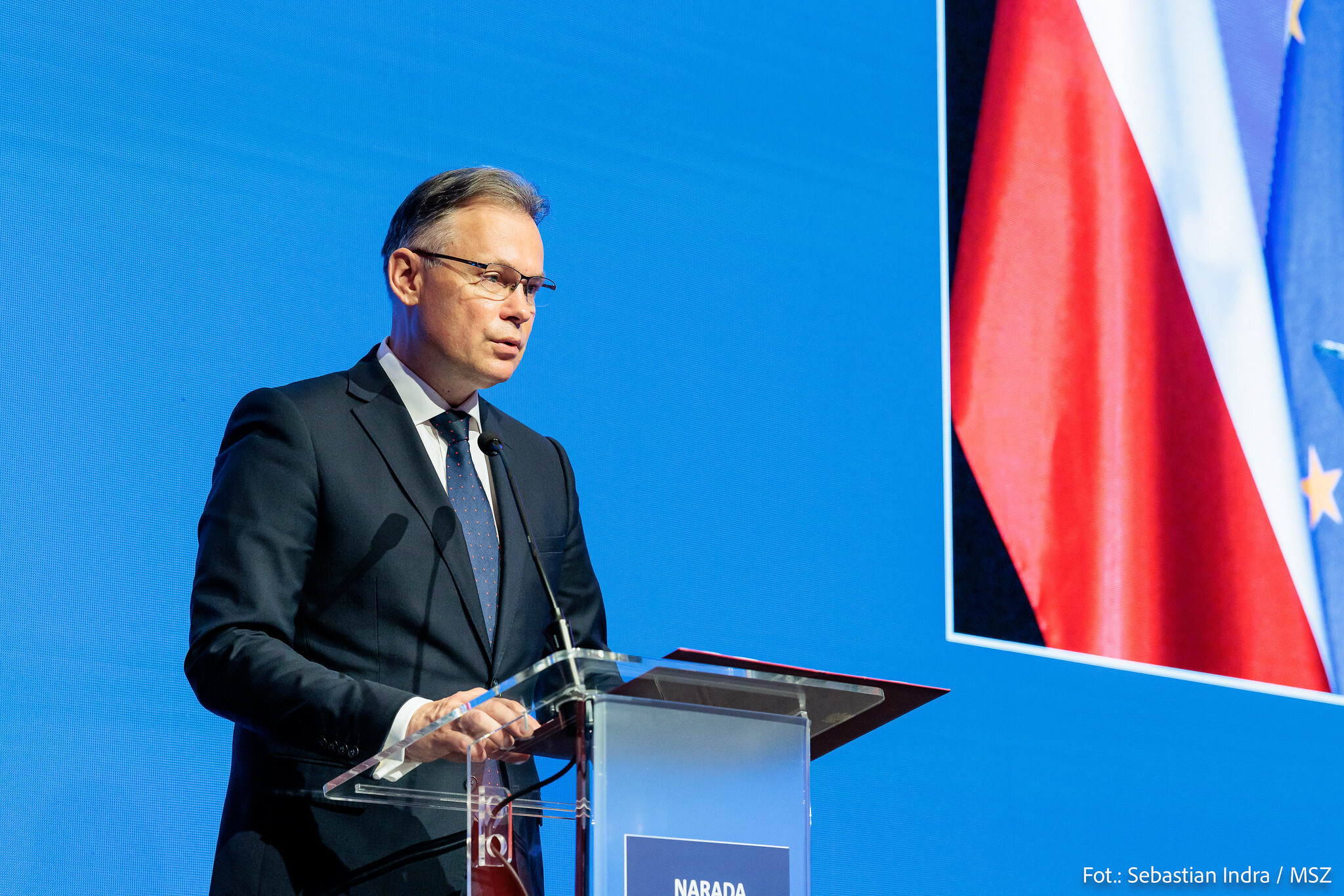Last September, the Polish government published a report on the war losses suffered by Poland at the hands of the Germans during World War II. You supervised the work on this report, which was created over several years. Based on this study, the Sejm passed a resolution that same month and the Polish Foreign Ministry sent a diplomatic note in early October in which Poland demanded war reparations from Germany for 6.6 trillion zlotys (€1.4 trillion).
What was the German reaction then and what is it now?
Germany’s attitude and position have been evolving in some ways. While at the very beginning, Poland taking up the issue came as a bit of a shock to the Germans, who tended to be in denial of certain historical facts, we can see now that thanks to our actions, our international pressure, dozens of meetings, interviews, and our activity in international forums, the Germans are looking more and more closely at what we are doing in that regard and are beginning to take this issue more seriously.
This is because it deals with the most fundamental issue of responsibility for war crimes, especially in the context of what we are witnessing today in Ukraine, i.e., Russian crimes committed there. I think that this debate that we have started, that is going on, also affects the perception of this historical issue in Germany itself. So I would say that we can see some evolution in their approach to the problem.
Are there any direct discussions with the German authorities?
Yes. Several such discussions have taken place. I attended meetings at the German Foreign Ministry several times and had discussions with three deputy foreign ministers. The topic has also been raised by (Polish) President (Andrzej) Duda and by (Polish) Prime Minister (Mateusz) Morawiecki, both publicly and during discussions with German partners. There was a series of meetings in Warsaw, with German MPs of the Polish-German friendship group, but also in Berlin, with a number of German parliamentarians.
The largest was a meeting at the German Council on Foreign Relations, DGAP, where there was a group of at least a dozen parliamentarians.
[pp id=79425]
Recently, I sent a letter to all members of the Bundestag and Bundesrat on this issue. I have just received a thank you from the coordinator of German-Polish Intersocietal and Cross-Border Cooperation at the Federal Foreign Office in the coalition government of Chancellor Olaf Scholz, Dietmar Nietan, writing on behalf of the SPD that they understand the problem and want to solve it in some way in a formula of dialogue with Poland and also with me.
On the other hand, most people in Europe, especially in Western Europe, are convinced that the subject of war reparations has long been closed and are often surprised when Greeks or Poles raise the issue 80 years after the war. In addition, Germany claims that Poland has already been paid reparations and that it renounced any further claims in 1953. How do things look from the Polish side?
Unfortunately, World War II went badly for Poland. First, the country was attacked by Germany, then by Russia. Poland was occupied for six years, and then, as a result of the Potsdam Conference, Russia occupied Poland for over 40 years until 1989.
As a result, Poland not only did not receive war reparations from Germany but was exploited by Soviet Russia after the war and was a country politically and economically subordinated to the Soviet Union.
These issues were never actually settled in Polish-German relations. No bilateral Polish-German agreement or peace treaty was signed, although Germany signed such agreements with other countries in the 1950s and 1960s. It can be said that German diplomacy maneuvered shrewdly to avoid resolving the issue after the war ended. The German reunification treaty also omitted this topic, and Poland was not a party to it.
[pp id=68601]
It can be said that the fact that Germany managed to maneuver for so many years and avoid addressing this issue with Poland is one of the greatest successes of German post-war diplomacy, as it avoided talks about reparations for the gigantic destruction caused and war crimes.
But did Poland actually relinquish these reparations in 1953, as Germany claims?
There is no document confirming the actual waiver of reparations. It can be said that this is a media fact rather than a legal or political fact. There were no documents published in official Polish publications, and no diplomatic note was addressed by the Polish government to the German government on the matter. And there have not been any Polish-German agreements in this regard either.
Therefore, it should be made clear that this topic has been an unresolved issue in German-Polish relations since the war.
Why was the issue taken up only now, that is, a few years ago, as it took time to prepare this report, and not immediately after the fall of communism?
We should rather ask why Germany never proposed to Poland to examine this subject. It was Germany that was the aggressor; it was Germany that committed the crimes. Germany should feel a moral, legal, and political responsibility to address this issue, but it never did.
Reproaching the country that is claiming compensation for not having acted earlier is, in my opinion, a complete reversal of moral vectors. It is the Germans who should be asked why they have not settled the case or, if they claim that the case is closed, on what basis they can say so and how much they paid Poland.
My question was rather about why no one from the Polish side had addressed this issue before.
This is, of course, a question that should be addressed to our predecessors. Until 1989, Poland was a non-sovereign country, subordinated to the Soviet Union. After 1989, not raising the issue formally was a mistake.
I know that some politicians and some representatives of the Polish government mentioned this issue, but they did not put it as strongly as our government. It must also be said that never before had a war loss report been formally prepared as accurately and reliably as the one we prepared. This makes a crucial difference.
How was this report prepared? How many people worked on it? How many years did it take?
It took almost five years to prepare the report, with a break for Covid and lockdowns. More than 30 experts from various fields worked on the report: demographers, economic historians, appraisers… After many years, this team managed to get together. Ten external expert opinions were also engaged.
The report was discussed and analyzed by both specialists and politicians. Added to the report was a second volume containing photographs, as well as a third volume, a list of war crime sites.
It can be said that after five years of hard, collective work (the report was published on Sept. 1, 2022), the report is an important historical document, but also a political document.
Is there a substantive discussion in Poland regarding the content of this report? I suppose that it must be very complicated to value the damage done at such a scale. Are any points in the report being disputed? Is anyone saying, for example, that this or that should not be valued that way?
The problem is precisely that there is no substantive discussion of the report. We explained our methodology for calculating losses. Anyone who digs deep into its content and reads it will find that these are very conservative amounts.
There is no doubt we could value these losses at a far higher amount, and although the amount of war losses we have calculated is shockingly large, it could be multiplied times three, times five, or even times 10 if we adopted other methodologies for calculating losses and their value. All these losses are calculated in a very conservative way.
For example, the value of human life as a component of lost GDP for Poland was valued at $200,000. You will admit that this is not a large amount when considered in terms of the economic loss for the state. We valued a month of forced labor at 1,000 zlotys, which is a little over €200. Today, in Germany, no one would want to work for €200.
If we had adopted other values and other ways of valorization, this report could have led to damages that totaled up to three, five, or 10 times the amount we give.
Is the reparations issue just a question of money, however? I have heard and read your statements about German revisionism, not in relation to the Holocaust but concerning the crimes committed against Poles and other occupied nations, especially in the East, where the occupation looked different from the occupation in France, for example. Does this report and Poland’s demands also have a purpose other than financial?
Yes, definitely. By publishing this report, we wanted it to be a contribution to a broader discussion in Poland, but also in the world and especially in Germany, about the history of World War II, and how that history has evolved over the years.
For today, we rub our eyes in disbelief when we see that Germans consider themselves victims of the Nazis and that they dilute their responsibility for World War II by using semantics that separates the Nazis from the Germans. Today, we see in the world that in the context of World War II, people no longer say Germans, but Nazis, which causes successive generations of people to separate the responsibility of Germans from that of Nazis.
Worse still, we are also witnessing a disturbing phenomenon: As a large part of the concentration camps were located in Poland, some now say they were Polish camps, seemingly holding Poles responsible for them. Also present is the narrative that Poles collaborated with the Nazis. Suddenly, Germany completely disappears from the story, and only the Nazis and the camps in Poland remain.
This way, an alternative history of World War II is being created. The purpose of our report is to stop this false narrative and put the narrative on the right track.
Aren’t you concerned, in the context of the war in Ukraine, that demanding reparations from Germany is going to lead to divisions within NATO and the EU?
There never was a good time to take up the reparations issue. Either Poland was under Soviet occupation, or it was seeking accession to NATO and the European Union. There were always more important goals that pushed this historical issue to the sidelines.
But we cannot build fair, solid relations between countries without settling such an important issue. Therefore, we believe that the opposite is true.
Our report shows how war losses have had a long-term impact on demographics, on the economy, and on development. After all, the fact that Poles are still immigrating to Britain, Iceland, France and Germany for work is also a result of the war and the communist occupation that followed the war. We show that the long-term effects of the war affect successive generations of Poles.
This will also happen in Ukraine, where it will not be possible to combat the effects of the war in just five or 10 years. They will be stretched over time and will negatively affect Ukraine’s demographics, economic growth, etc., etc. These are very important aspects that we show from the perspective of 80 years. They will also affect Ukraine for decades to come.





